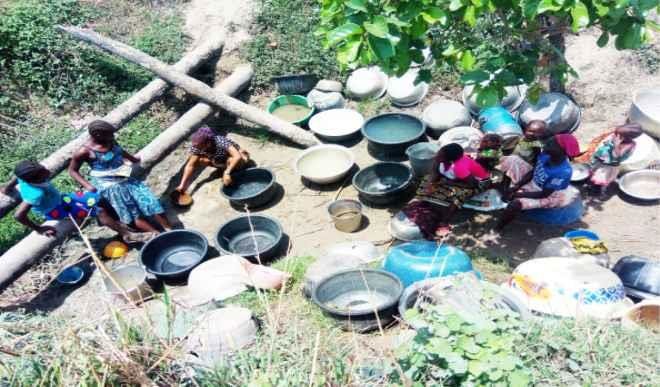Kabi-Kasa locals risk typhoid, cholera drinking unclean water
A community health worker at Kabi-Kasa, Mr. Biko Haruna Yahaya, has said the people risked contracting typhoid and cholera from drinking contaminated water fetched from hand-dug earth wells. He lamented also that despite been a health worker who knows the implications of drinking such water, he had no option as he and his family also […]


A community health worker at Kabi-Kasa, Mr. Biko Haruna Yahaya, has said the people risked contracting typhoid and cholera from drinking contaminated water fetched from hand-dug earth wells.
He lamented also that despite been a health worker who knows the implications of drinking such water, he had no option as he and his family also drink it.
“Even I and my family drink the water too, but we always make sure that we boil it very well especially when the borehole stops working,” he said.
He said the saddest part was that the local clinic where he works does not have the medical equipment to carry out tests for diseases such as cholera, typhoid and diarrhoea.
Biko, who said he had worked as a community health worker for over 18 years at Kabi-Kasa, said most of the sicknesses he treats were typhoid and malaria, attributing the former’s prevalence to the nature of water the locals drink.
He appealed to the authorities of the council, under the leadership of Alhaji Abdullahi D. Galadima, to liaise with the FCT administration and provide boreholes or refurbish the broken down ones to cushion the perennial water problem facing the community and also to avert outbreak of water-borne diseases in the area.
He also called on the council authorities to liaise with the FCT health and human services secretariat on the need to open the community health centre which, he said, had been under lock and key for over three years.
“The small clinic I operate does not have space to admit patients. Sometimes when I am overwhelmed I just allow some of them occupy any little space they can get on the floor. But if the new clinic is opened we wouldn’t have a situation like that,” he said.
Our reporter observed five wells inside a Fadama area close to the community healthcare centre where women were patiently waiting for the muddy water to collect so that they could fetch.
Mrs. Amina Abdullahi, a housewife who spoke with our reporter at the well said lack of potable drinking water had been a major problem for residents of the community in the dry season.
She said she left home early in the morning but was yet to get even a basin of water from the well because of the crowd of people that had come from various homes with basins to also get water.
She said at other times she trekked for over two hours to neighbouring Kutupe and Nave communities in search of drinking water.
Abdullahi, who is a mother of three, said since she got married in the community over six years ago, water scarcity had been the main problem for residents and that all attempts to solve it appeared to have failed.
She said some women wake up as early as 4:00am and head to the wells, adding that those who do not wake up early ended up spending the whole day at the Fadama.
“In fact, it is God that saved me from being bitten by a snake. I left home to fetch water at the pond at 11:00pm and just some few metres before the pond I came across a snake and it refused to leave the path. I had to turn back home that night.
“And apart from that, there are times that women fight here at this pond in the struggling to fetch water. How I wish you were here early in the morning to see for yourself how women quarrel and fight over this water that is not even clean,” she added.
She said there were three hand dug boreholes at different locations in the community provided last year April by some missionaries, but that all the three boreholes had broken down.
Mrs. Laraba Danjuma, who also spoke with our reporter, said anytime she fetches water from the pond she put a purifying chemical for one hour before she drank it.
“Just look at the colour of the water that we are drinking in this village, it is only God that is saving us, if not, many people would be sick,” she said.
The traditional ruler of the community, Danjuma Kpanko, who spoke with our reporter at his palace, said the perennial water problem had become a nightmare to the people.
Kpanko, appealed to the authorities of the council to help in refurbishing the grounded boreholes at the community, saying that three hand pump boreholes built by some missionaries last April have also broken down.
He further urged the council chairman to get the FCT administration to open the new health centre that was completed over three years ago.
When contacted, the chairman of Kuje Area Council, Alhaji Abdullahi D. Galadima, said the council was embarking on drilling of 28 hand pump boreholes across various communities of the council to ease the water problem in the area.
He said 18 had so far been drilled and commissioned across some villages, saying that though Kuje Area Council has the highest number of villages, his administration was determined to provide viable amenities that will impact on the lives of residents of the council.
